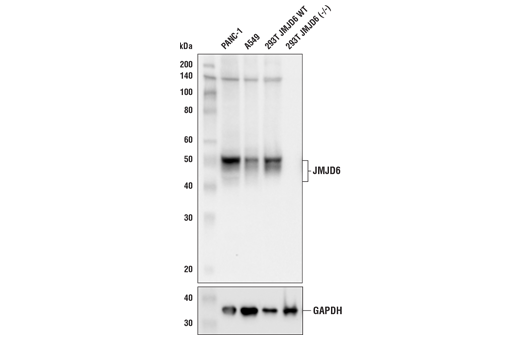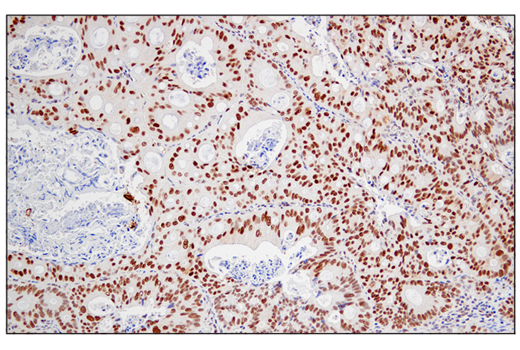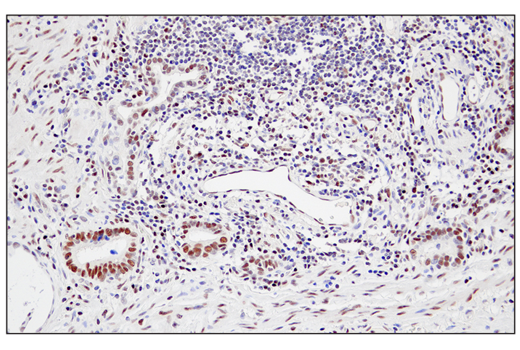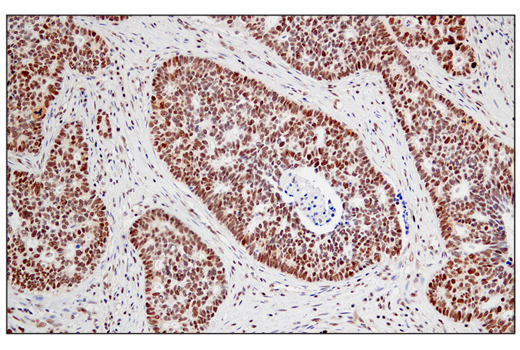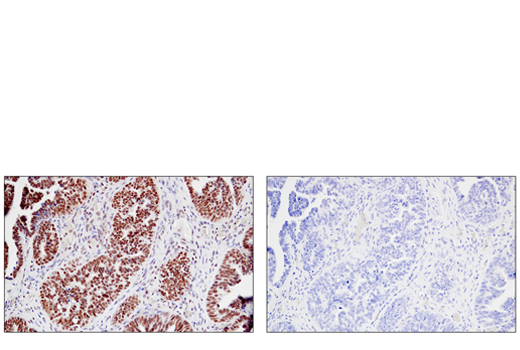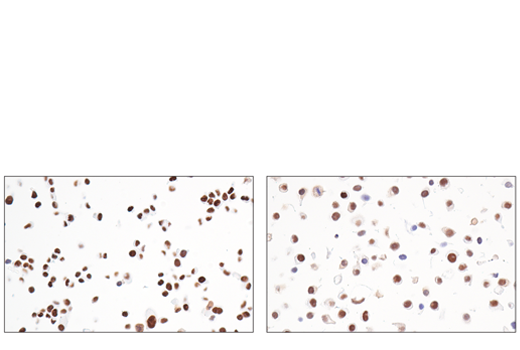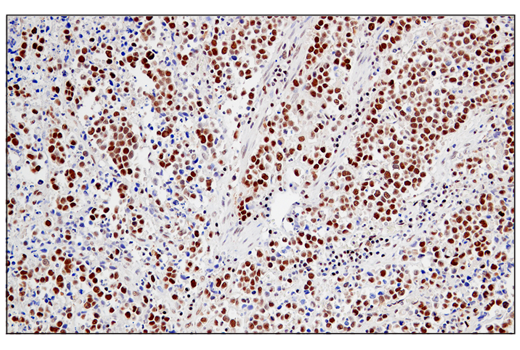WB, IHC-P
H Mk
Endogenous
46, 49
Rabbit IgG
#Q6NYC1
23210
Product Information
Product Usage Information
| Application | Dilution |
|---|---|
| Western Blotting | 1:1000 |
| Immunohistochemistry (Paraffin) | 1:3200 |
Storage
Specificity / Sensitivity
Species Reactivity:
Human, Monkey
Source / Purification
Monoclonal antibody is produced by immunizing animals with recombinant protein specific to the amino terminus of human JMJD6 protein.
Background
Jumonji domain-containing protein 6 (JMJD6) is a bifunctional metalloenzyme belonging to the large family of JmjC domain-containing proteins. These proteins are ferrous iron- and 2-oxoglutarate-dependent enzymes (Fe2+/2OG) that catalyze hydroxylation and demethylation reactions on a wide variety of protein and nucleic acid substrates (1). JMJD6 is thought to act as both a lysyl-hydroxylase and an arginine demethylase, although the latter activity remains controversial. Specifically, JMJD6 has been shown to catalyze 5-hydroxylation of Lys15 and Lys276 residues on the protein U2AF2 / U2AF65 in vivo, affecting pre-mRNA splicing activity (2). It has also been reported that JMJD6 hydroxylates the Lys382 residue of p53, preventing acetylation and promoting association of p53 with MDMX, resulting in inhibition of p53 transcriptional activity (3). In addition to hydroxylase activity, JMJD6 also acts as an arginine demethylase by targeting histone H3 at Arg2 (H3R2me) and histone H4 at Arg3 (H4R3me). Unlike other members of the JmjC family, JMJD6 appears to have no lysine demethylase activity (4). Studies have shown that JMJD6 colocalizes with BRD4 at a subset of enhancers to demethylate H3R2me2 repressor marks (5). It has also been reported to demethylate non-histone substrates, such as estrogen receptor (ERα) (6), heat shock protein 70 (HSP70) (7), RNA helicase A (8), and the TRAF6 E3 ubiquitin ligase following activation of toll-like receptors (9).
Although mutations in the sequence of JMJD6 have not been observed in cancer, its overexpression is identified in various cancers and is associated with aggressive disease progression and poor prognosis (10). This holds true for certain types of colon (3), lung (11), and breast cancers (12, 13). Based on these findings, JMJD6 has drawn interest as a potential therapeutic target and biomarker for certain cancer types.
- Kwok, J. et al. (2017) Front Genet 8, 32.
- Webby, C.J. et al. (2009) Science 325, 90-3.
- Wang, F. et al. (2014) PLoS Biol 12, e1001819.
- Hahn, P. et al. (2010) PLoS One 5, e13769.
- Liu, W. et al. (2013) Cell 155, 1581-95.
- Poulard, C. et al. (2014) PLoS One 9, e87982.
- Gao, W.W. et al. (2015) Proc Natl Acad Sci U S A 112, E3327-36.
- Lawrence, P. et al. (2014) Virology 452-453, 1-11.
- Tikhanovich, I. et al. (2015) J Biol Chem 290, 22236-49.
- Vangimalla, S.S. et al. (2017) Biomolecules 7, .
- Zhang, J. et al. (2013) Tumour Biol 34, 2397-401.
- Lee, Y.F. et al. (2012) Breast Cancer Res 14, R85.
- Poulard, C. et al. (2015) PLoS One 10, e0126181.
Species Reactivity
Species reactivity is determined by testing in at least one approved application (e.g., western blot).
Western Blot Buffer
IMPORTANT: For western blots, incubate membrane with diluted primary antibody in 5% w/v nonfat dry milk, 1X TBS, 0.1% Tween® 20 at 4°C with gentle shaking, overnight.
Applications Key
WB: Western Blotting IHC-P: Immunohistochemistry (Paraffin)
Cross-Reactivity Key
H: human M: mouse R: rat Hm: hamster Mk: monkey Vir: virus Mi: mink C: chicken Dm: D. melanogaster X: Xenopus Z: zebrafish B: bovine Dg: dog Pg: pig Sc: S. cerevisiae Ce: C. elegans Hr: horse GP: Guinea Pig Rab: rabbit All: all species expected
Trademarks and Patents
Limited Uses
Except as otherwise expressly agreed in a writing signed by a legally authorized representative of CST, the following terms apply to Products provided by CST, its affiliates or its distributors. Any Customer's terms and conditions that are in addition to, or different from, those contained herein, unless separately accepted in writing by a legally authorized representative of CST, are rejected and are of no force or effect.
Products are labeled with For Research Use Only or a similar labeling statement and have not been approved, cleared, or licensed by the FDA or other regulatory foreign or domestic entity, for any purpose. Customer shall not use any Product for any diagnostic or therapeutic purpose, or otherwise in any manner that conflicts with its labeling statement. Products sold or licensed by CST are provided for Customer as the end-user and solely for research and development uses. Any use of Product for diagnostic, prophylactic or therapeutic purposes, or any purchase of Product for resale (alone or as a component) or other commercial purpose, requires a separate license from CST. Customer shall (a) not sell, license, loan, donate or otherwise transfer or make available any Product to any third party, whether alone or in combination with other materials, or use the Products to manufacture any commercial products, (b) not copy, modify, reverse engineer, decompile, disassemble or otherwise attempt to discover the underlying structure or technology of the Products, or use the Products for the purpose of developing any products or services that would compete with CST products or services, (c) not alter or remove from the Products any trademarks, trade names, logos, patent or copyright notices or markings, (d) use the Products solely in accordance with CST Product Terms of Sale and any applicable documentation, and (e) comply with any license, terms of service or similar agreement with respect to any third party products or services used by Customer in connection with the Products.
